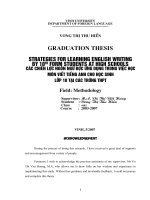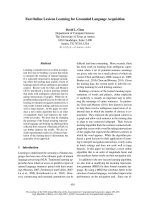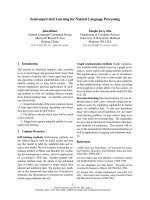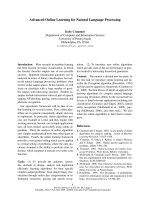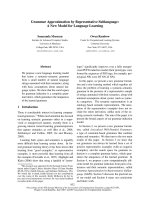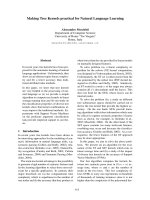STRATEGIES FOR SUCCESSFUL LANGUAGE LEARNING
Bạn đang xem bản rút gọn của tài liệu. Xem và tải ngay bản đầy đủ của tài liệu tại đây (1.97 MB, 50 trang )
Welcome to the seminar
on “Strategies for success
in learning English”
Give answer to the question below.
How can we become successful
English language learners?
To become a better English learner, you
should:
- know what kind of learner you are.
- discover what learning styles you prefer.
- motivate yourself and set goals.
- develop self-confidence.
- learn to take risks.
- know the influence of your native language.
- know how to use learning strategies.
1. What kind of learner are
you?
A
How do you like
studying? In pairs /
groups or
individually?
B
Not all language learners are the same
in their preferences, and therefore it’s
important for each learner to know
himself or herself well.
Do the questionnaire and tell your
friends what kind of learner you are.
Strategies for Success
-Don’t mind if people laugh when
you speak English.
-Study English outside class.
-Get the general idea when you read
or listen to English.
-Don’t get upset when you make
mistakes.
-Learn from your mistakes.
-Work in pairs and groups when
necessary.
- Ask questions when necessary.
- Take notes of important words,
idioms, structures…. in class.
2. Discovering your
learning styles
Complete the questionnaire and
discover your learning style.
Questionnaire Score
30 or more = you are a reflective
learner
You prefer doing things slowly.
29 or less = You are an impulsive
learner
You prefer doing things fast.
Neither style is good or bad.
You should balance the two styles, i.e. to be
not too fast, and not too slow.
Successful Language Learners Usually:
-understand their own learning styles and
preferences.
-know which styles help them and use
those styles.
-know which styles might hurt them and
change or avoid those styles.
3. Motivating yourself
and setting goals
What is motivation?
Motivation means having a real
purpose in doing something.
Types of
motivation
Internal
External
motivation
motivation
Internal motivation coming from
inside yourself
External motivation coming from
others
For example
1. You learn English so that you can get a
better job.
2. You learn English because many people
around you learn it.
3. You do your homework because the
teacher tells you to do.
4. You do your homework because you are
interested in the topic.
Discovering your motivation by
completing the questionnaire.
Questionnaire Score
Score Part 1
Part 2
13-20 High internal High motivation
motivation
from others
5-12
Low internal Low motivation
motivation
from others
Please remember:
When you are motivated by your own
wants and needs you are almost always
successful.
People who are motivated by outside
influences are usually not so successful.
Strategies for Success
1. Think about your motives now. ( Yes/No)
You care a lot about your grades.
You have to pass the exams.
You will do better in your job.
You will have more fun talking with
English speakers.
You will be able to use the Internet better.
You will enrich your knowledge.
2. Set some specific goals for yourself to
pursue in the next few weeks.
3. Look at your goals frequently and
track your progress.
4. As you complete goals, set new ones.
4. Developing
self-confidence
What does learning a new language
involve?
Learning a new language involves:
-Learning a whole new system of sounds
-Remembering thousands of new words
-Learning many rules of grammar and their
exceptions
-Talking to people in different situations
-Listening to people in different situations
-Writing to people in different situations
-Understanding a new culture
Answer the questions below.
1. How confident are you when you speak
English?
2. How do you feel about reading English?
3. How do you feel about writing English?
4. How do you feel about listening to English?
5. How do you feel about your grammar
knowledge?
6. How do you feel about your vocabulary
knowledge?
Strateges For Success
Develop overall self-confidence
- Make a list of your strengths and
weaknesses.
- Set goals to overcome your weaknesses.
- Tell yourself that you are smart and you
can do it.
Think positively
- Don’t say “I can’t” or “I never get it.”
- Don’t let other classmates’ bad attitudes
affect you.
- Respect your teacher and your teacher
will respect you.

